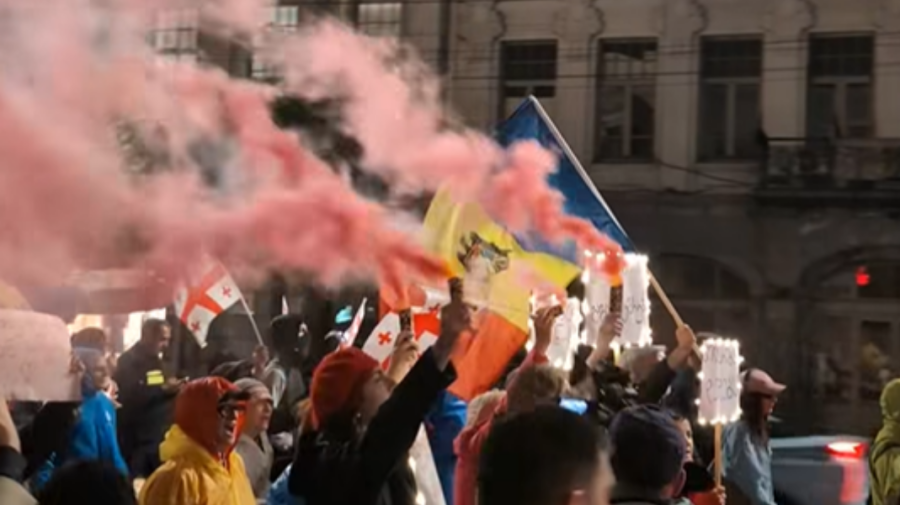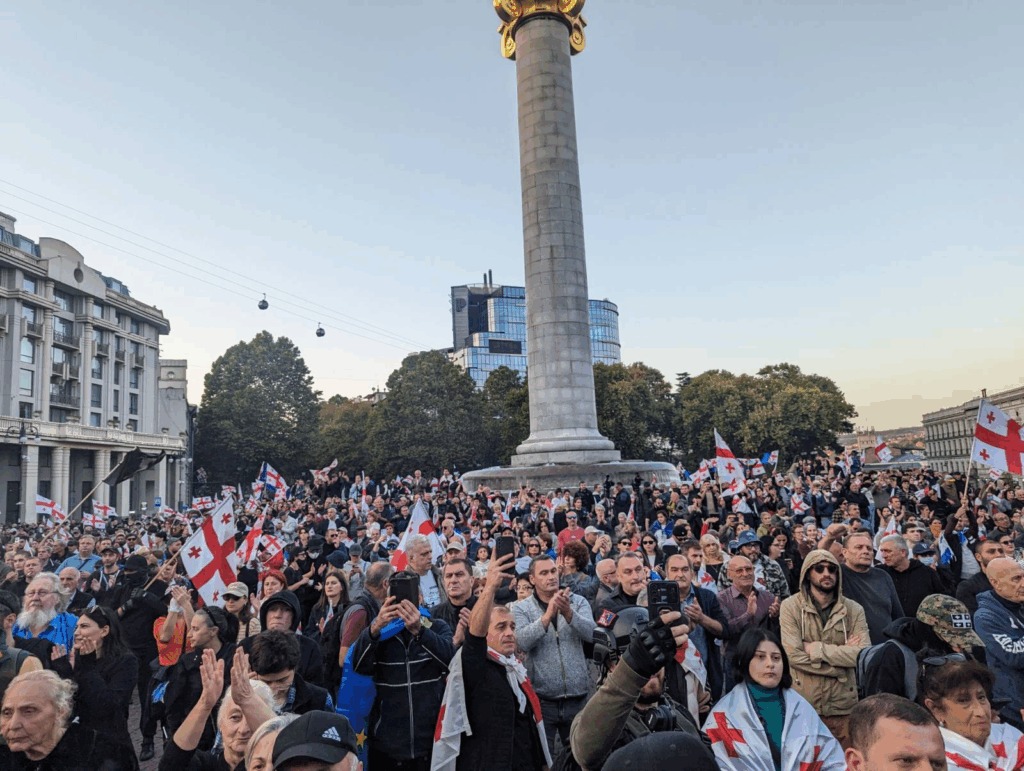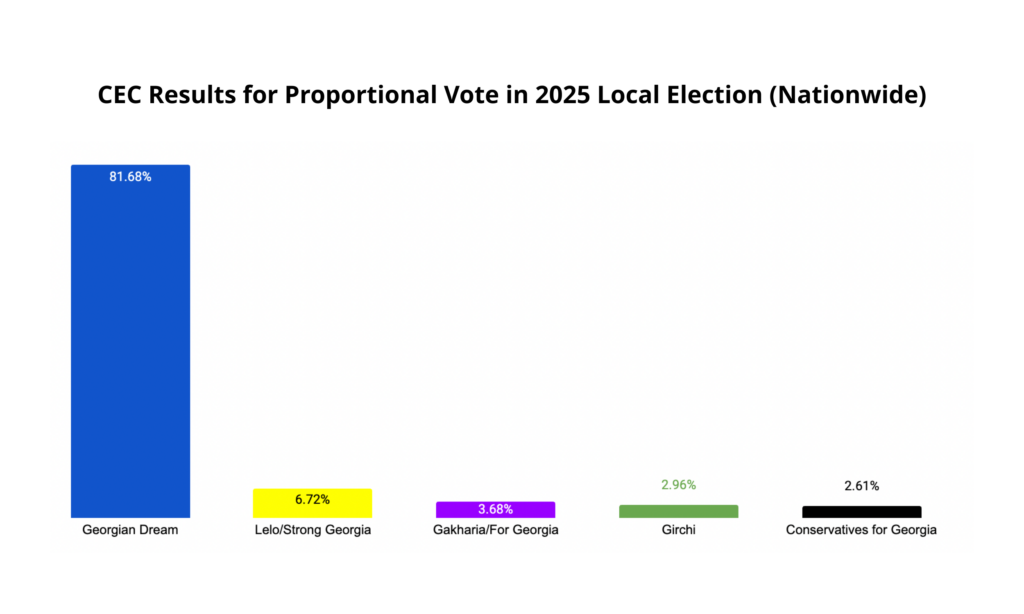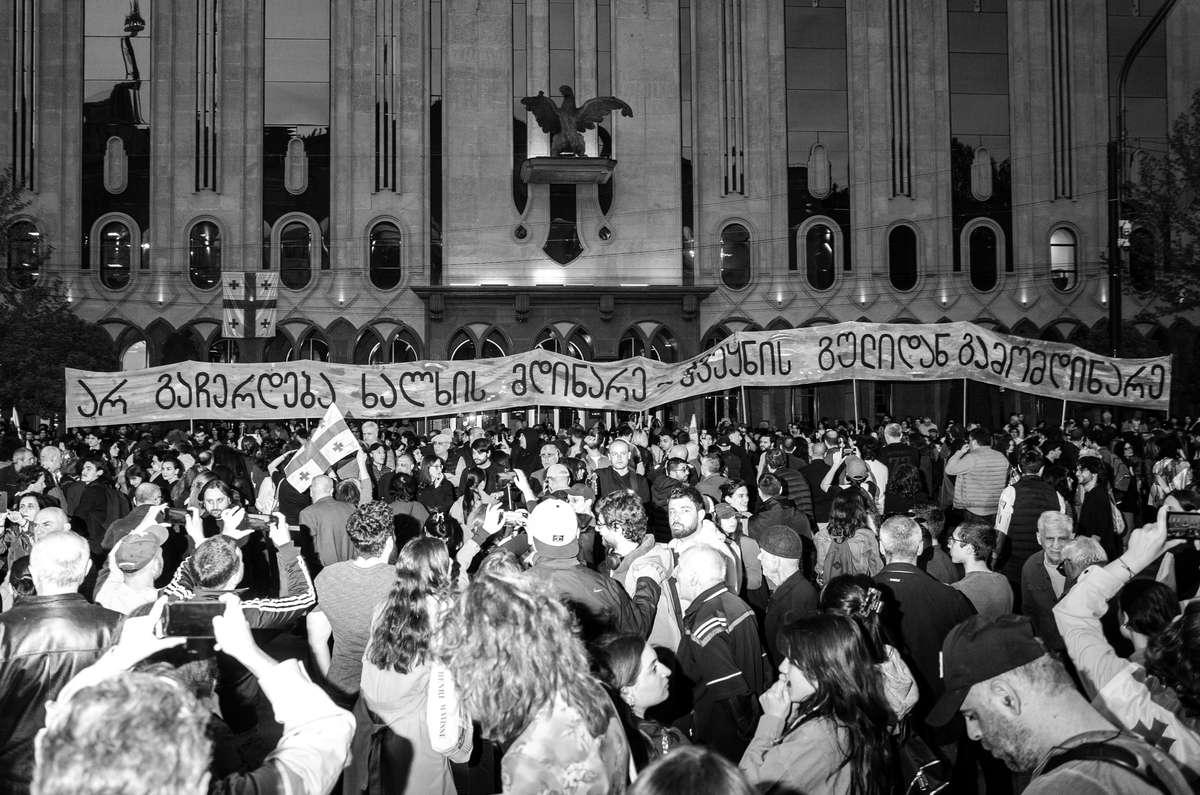On 4 October, opera singer Paata Burchuladze stood before tens of thousands in Tbilisi's Freedom Square and issued an ultimatum: Georgia's government had 24 hours to surrender power.
By dawn 5 October, security forces arrested all five protest organizers—Burchuladze, Irakli Nadiradze, Murtaz Zodelava, Paata Manjgaladze, and Lasha Beridze. By 6 October, prosecutors formally charged them under Articles 187, 222, 225, and 317 of Georgia's Criminal Code. They face up to nine years in prison.
The timing wasn't random. Days earlier, Moldova had defeated $180 million in Russian election interference by arresting vote-buyers and freezing Kremlin-funded accounts. Moldova's pro-EU government used institutional power to fight external Russian manipulation and won. Georgian protesters saw proof that democratic resistance could work—and tried to replicate it.
But Georgia faces the opposite problem: their government has already been captured.
Georgian Dream, ruling since 2012, has become what Moldova fought against—a party running the Kremlin playbook of foreign agent laws, civil society crackdowns, and authoritarian consolidation. In October 2024, Georgian Dream allegedly stole 10% of the vote to secure a parliamentary majority. By October 2025, they claimed 80% in local elections that eight opposition parties boycotted entirely.
For a year, Georgia's protests ran on endurance—showing up despite arrests, marching despite crackdowns, persisting without victory in sight. Moldova's breakthrough transformed that endurance into something else: aggressive confidence. The belief that what worked there could work here.
When confidence meets a prepared crackdown
The shift showed immediately. A 24-hour ultimatum for governmental overthrow. An opera singer calling for the government's "arrest." Moldovan flags waving alongside Georgian ones in Tbilisi. Tens of thousands marching toward the presidential palace.
"Speaking about the protesters as a whole, the main message remains the activists' readiness to continue protesting for as long as necessary to return the country to a European path," explains Philip, a Georgian journalist covering events. "But the 4 October protests became radicalized after Paata Burchuladze's statement."
What happened at the presidential palace depends on who you ask. Georgian experts believe Burchuladze and protesters expected to find the doors open—a suspicion Burchuladze's son confirmed the next day. President Salome Zourabichvili called it "a staged provocation by the government to discredit 310 days of peaceful protest."
Provocation or genuine attempt, the outcome was identical: Georgian Dream got its crackdown pretext. Prime Minister Irakli Kobakhidze claimed the government foiled an "attempted coup planned by foreign intelligence services." The clashes left 21 police officers and six protesters hospitalized.

Government claims victory, reality shows cracks
Georgian Dream's rhetoric escalated immediately. The government blamed "external forces, primarily the EU ambassador," according to Philip. Levan Makhoshvili, Chairman of the Parliamentary Committee on European Integration, declared that responsibility for violence lies with all participants—"even those who simply weren't present."
The Ministry of Internal Affairs announced any future protest would be treated as an attempt to destabilize the government—effectively banning peaceful assembly.

Georgia’s pro-Russian rulers claim landslide in local elections as opposition leaders warn of vote rigging
"Peaceful protests continued on Rustaveli Avenue on 5 October, and protesters were able to block the avenue without hindrance," Philip observes.
The gap between threatening rhetoric and actual enforcement revealed a government unsure how far it could push without triggering international backlash or domestic explosion.
The election numbers tell their own story.
Georgian Dream claimed over 80% across all municipalities. The party, controlled by billionaire ex-prime minister Bidzina Ivanishvili—sanctioned by the US for promoting Russian interests—swept all municipalities despite eight opposition parties boycotting, dozens of activists jailed, independent media raided, and a year of massive protests.

Moldova, with a pro-EU government and clear democratic trajectory, won by roughly 10%.
"Due to the absence of most independent observers, it is difficult to accurately assess the scale of the fraud," Philip explains. "What is clear is the colossal pressure exerted on domestic independent organizations like Transparency International or ISFED."
International observation faced deliberate sabotage. OSCE/ODIHR couldn't deploy after Georgian Dream extended an invitation less than a month before election day. Major missions from US groups like the National Democratic Institute and International Republican Institute stayed away. So did the European Parliament's delegation.
What hangs in the balance
Daily protests continue on Rustaveli Avenue—now past day 311 since Georgian Dream suspended EU integration. But the movement faces a leadership vacuum. Numbers have been declining from fatigue. The opposition can't unite around strategy or leadership.
The arrested leaders now face two possible paths: become martyrs who galvanize resistance (as happened in Belarus 2020), or cautionary tales that break the movement through fear. International observers watch for which direction Georgia tips.
Moldova's situation was fundamentally different from Georgia's. Moldova had a pro-EU government with institutional power fighting external Russian interference. Georgia's protesters face a captured government that controls those same institutions. Moldova arrested vote-buyers and froze accounts linked to Russia's $180 million interference operation. Georgia arrests protesters and charges them with coup attempts.
The pre-announced 4 October "revolution" gave Georgian Dream weeks to prepare—leaked documents showed special forces mobilizing, equipment stockpiling. Moldova's resistance had institutional backing and strategic planning. Georgia's protesters walked into a prepared crackdown.
"Speaking specifically about the events of 4 October, it's likely that the situation didn't require Russia's intervention, as the narratives voiced by Georgian Dream weren't much different from their overall policy over the past six months," Philip observes.
Georgian Dream has internalized the Kremlin playbook so thoroughly it runs automatically: stage confrontations, blame external forces, threaten harsh crackdowns, declare opponents foreign agents. The party no longer needs direct Russian orchestration to operate as Russian-aligned authoritarianism.
The question Moldovan flags in Tbilisi couldn't answer: Does breakthrough energy create breakthroughs when your own government has been captured—or does it push movements into confrontations they're not ready to win?
Georgia is finding out. The answer will determine whether democratic institutions survive in the South Caucasus, and whether Moldova's model works when the enemy is already inside the gates.





